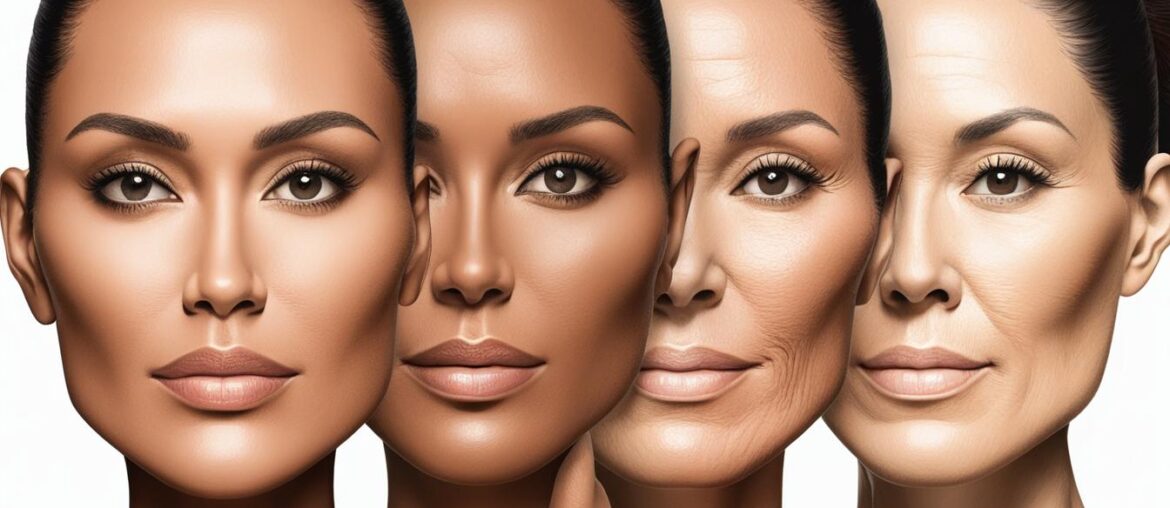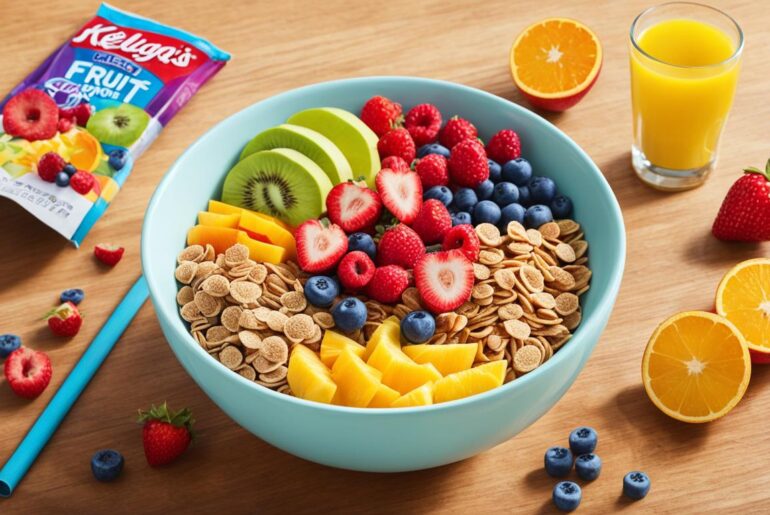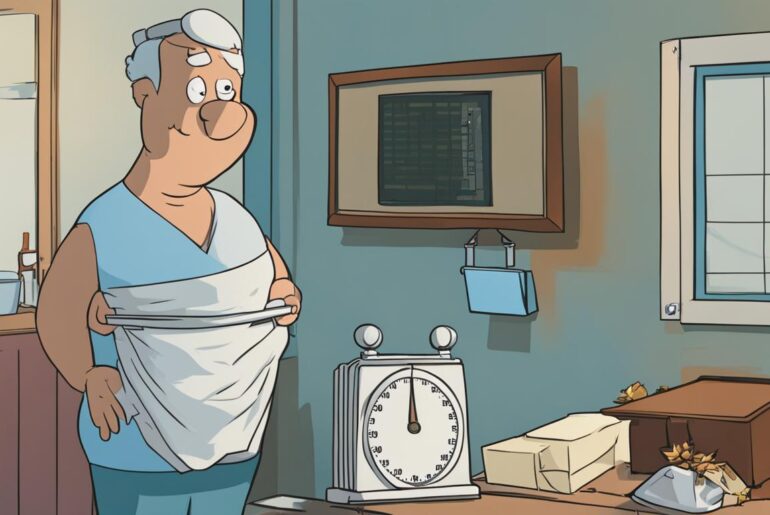When I embark on a weight loss journey, I often wonder why my face starts to appear thinner. It’s fascinating how our bodies respond to changes in weight, and this includes the impact it has on our facial appearance. To understand why my face gets skinny when I lose weight, let’s explore the effects of weight loss on the face and the facial changes that occur during this process (check out my post on effects of weight loss here).
Key Takeaways:
- Weight loss can lead to a thinner and more slim appearance in the face.
- Natural fat pads in the face and neck shrink during weight loss, causing a sunken appearance.
- Loss of fat can make the skin sag and wrinkle, as fat supports the skin’s structure.
- Factors such as aging, illness, lifestyle habits, and diet contribute to a gaunt face.
- Maintaining overall health and considering medical treatments like facial fillers can help restore lost volume in the face.
Gaunt Face and Aging
As you age, your face naturally loses fat, leading to a thinner and more angular appearance. This loss of subcutaneous fat can result in sunken cheeks and increased sagging skin. Additionally, the reduction in collagen and elastin proteins in your skin contributes to decreased skin elasticity, further accentuating wrinkles and sagging. Factors like genetics, sun exposure, and lifestyle habits like smoking can accelerate the aging process of your face.
As we age, our face undergoes various changes that contribute to a gaunt appearance. One of the main factors is the loss of facial volume, particularly fat, which results in a thinner and more angular face. This loss of fat can cause sunken cheeks and an overall gaunt look.
In addition to fat loss, the decrease in collagen and elastin proteins in the skin leads to decreased skin elasticity. This means that the skin is less able to bounce back and becomes more prone to sagging and wrinkles. These changes, coupled with the natural thinning of the face, contribute to a gaunt appearance.
Furthermore, factors like genetics, sun exposure, and lifestyle habits such as smoking can accelerate the aging process of the face. Genetics play a role in determining how quickly and severely facial volume loss occurs, while sun exposure can break down collagen and elastin, exacerbating the sagging and wrinkles. Additionally, smoking has been shown to decrease blood flow to the skin, leading to a thinner and more aged appearance.
To combat the effects of aging on the face, there are various options available, including medical treatments and lifestyle changes. Facial fillers, such as hyaluronic acid or calcium hydroxyapatite-based fillers, can be injected beneath the skin to restore lost volume and smooth out wrinkles. These fillers can help plump up the face and create a more youthful appearance. Another option is fat transfer, where fat from another part of the body is harvested and injected into the face to restore volume.
Key Points:
- The natural aging process leads to facial volume loss, resulting in a gaunt appearance.
- Loss of collagen and elastin contributes to decreased skin elasticity and increased sagging and wrinkles.
- Genetics, sun exposure, and lifestyle habits can accelerate the aging process of the face.
- Facial fillers and fat transfer are options for restoring lost volume and improving the appearance of a gaunt face.
Gaunt Face and Illness

Various illnesses can cause weight loss, leading to a gaunt face. When the body undergoes significant weight loss due to illness, the face can appear thinner and devoid of the usual plumpness. Eating disorders such as anorexia nervosa and bulimia nervosa can result in extreme weight loss and facial fat loss due to inadequate protein consumption. Additionally, conditions like cancer and its treatments can lead to a decrease in appetite and significant weight loss, resulting in a gaunt facial appearance.
Digestive conditions such as cirrhosis, celiac disease, and Crohn’s disease can also cause unintentional weight loss, which can give the face a hollow and gaunt appearance. These conditions can affect the body’s ability to absorb nutrients, leading to overall weight loss, including in the face. Lastly, depression can impact appetite and result in weight loss, contributing to a gaunt face.
Examples of Illnesses and Their Effects on Facial Fat Loss
Below are some common illnesses and their effects on facial fat loss:
| Illness | Effect on Facial Fat Loss |
|---|---|
| Cancer | Decreased appetite and significant weight loss leading to a gaunt face |
| Eating disorders (anorexia nervosa, bulimia nervosa) | Inadequate protein consumption resulting in excessive weight loss and a thinner-looking face |
| Digestive conditions (cirrhosis, celiac disease, Crohn’s disease) | Unintentional weight loss due to impaired nutrient absorption resulting in a gaunt facial appearance |
| Depression | Impact on appetite leading to weight loss and a gaunt face |
It’s important to address the underlying illness and seek appropriate medical treatment to restore overall health, which can also help improve the appearance of a gaunt face. Consulting with healthcare professionals, including doctors, nutritionists, and therapists, can provide guidance and support in managing both the illness and associated changes in facial appearance.
Gaunt Face and Diet
When it comes to maintaining a healthy facial appearance, your diet plays a crucial role. Consuming a well-balanced diet is not only important for your overall health but also for the vitality and structure of your face. Let’s explore the impact of diet on a gaunt face and facial aging.
A key factor in facial fat loss is the calorie deficit. When you consume fewer calories than your body needs, it starts using stored fat for energy, leading to overall fat loss, including in your face. As a result, your face may appear more sunken and gaunt.
Moreover, high sugar diets can contribute to premature facial aging. Excessive sugar consumption has been linked to negative effects on collagen and elastin, which are essential for maintaining the skin’s elasticity and firmness. Over time, this can lead to wrinkles, sagging skin, and a gaunter facial appearance.
To maintain a healthy facial appearance, it’s important to prioritize nutrient-rich foods that support skin health. Additionally, certain nutrients, such as iron, are particularly important for facial health. Low serum iron levels can negatively impact the skin and contribute to a gaunt appearance.
To illustrate the recommended and detrimental foods for a healthy facial appearance, below is a table highlighting examples:
| Recommended Foods | Avoid |
|---|---|
|
|
By making conscious choices about the foods you consume, you can help maintain a healthy facial appearance and slow down the aging process. However, it’s important to note that a balanced diet is just one piece of the puzzle. Other lifestyle factors, like regular exercise, adequate sleep, and proper skincare, also contribute to overall facial health.
Gaunt Face After Weight Loss

If you have recently started an exercise program and lost weight, you may notice that your face looks thinner. When you burn calories through exercise, your body burns fat from all parts of your body, including your face. Regular physical activity can contribute to overall weight loss, which can result in a reduction of facial fat. However, it’s important to maintain a healthy balance and avoid excessive exercise, especially in cases of extreme weight loss.
While exercise is beneficial for improving overall health and body composition, excessive exercise can lead to a gaunt appearance. In instances of extreme weight loss, such as through ultra-marathon running or prolonged periods of intense exercise, the body may reach low levels of body fat. This can cause the face to appear gaunt, as the loss of subcutaneous fat can result in a more sunken and hollowed-out appearance.
It’s essential to prioritize your overall well-being and listen to your body’s needs. Engaging in regular exercise and maintaining a healthy weight can promote a balanced facial appearance. However, excessive exercise can have negative effects on both physical and mental health. It’s important to consult with a healthcare professional or a certified fitness trainer to determine an exercise regimen that is safe and suitable for your individual needs.
Exercise Tips for a Healthy Facial Appearance:
- Engage in regular cardiovascular exercise, such as walking, jogging, or cycling, to promote overall fat loss.
- Incorporate strength training exercises to build and maintain muscle mass, which can help support facial structure.
- Include facial exercises specifically targeting the muscles in your face to help improve muscle tone and promote a fuller appearance.
- Stay hydrated throughout your exercise routine to support healthy skin elasticity.
- Ensure you are consuming a balanced diet that provides essential nutrients for optimal skin and facial health.
Remember, a healthy and balanced approach to exercise, combined with proper nutrition and skincare, can help you achieve a vibrant and youthful facial appearance. Listen to your body, prioritize self-care, and consult with professionals if you have any concerns about your health or appearance.
Gaunt Face and Lifestyle
Lifestyle factors play a significant role in facial aging and the development of a gaunt face. Several key elements, such as smoking, chronic stress, and poor-quality sleep, can contribute to premature aging and impact the overall appearance of your face.
Smoking and Facial Aging
Smoking and exposure to second-hand smoke can have detrimental effects on your skin and contribute to the development of a gaunt face. The chemicals in cigarettes, such as nicotine and carbon monoxide, constrict blood vessels, leading to reduced blood flow to the skin. This decreased blood flow deprives the skin of essential nutrients and oxygen, resulting in dryness, increased wrinkling, and a dull complexion.
Chronic Stress and Weight Loss
Chronic stress can impact various aspects of your health, including your appetite and weight. Prolonged periods of stress can lead to decreased appetite, which in turn can cause weight loss. This weight loss may be noticeable in the face, resulting in a thinner appearance.
In addition, stress triggers the release of cortisol, a hormone that can break down collagen, a key protein responsible for maintaining skin elasticity. The breakdown of collagen can contribute to sagging skin and the development of wrinkles.
Poor Sleep Quality and Facial Aging
Adequate sleep is essential for skin health and maintaining a youthful appearance. Poor-quality sleep, characterized by frequent interruptions or insufficient duration, can lead to a range of issues that contribute to facial aging.
During deep sleep, the body produces and releases growth hormone, which plays a crucial role in repairing and rejuvenating the skin. Inadequate sleep disrupts this process and hinders the body’s ability to repair skin damage caused by external factors, such as exposure to UV rays and environmental pollutants.
Furthermore, lack of sleep can increase inflammation throughout the body, including the skin. Inflammation can accelerate the breakdown of collagen and elastin, resulting in sagging skin, fine lines, and wrinkles.
“Our lifestyle choices, such as smoking, managing stress levels, and prioritizing quality sleep, can significantly impact the health and appearance of our face over time.”
The Impact of Lifestyle Choices on Facial Aging
Our lifestyle choices, such as smoking, managing stress levels, and prioritizing quality sleep, can significantly impact the health and appearance of our face over time. By avoiding smoking and second-hand smoke, finding healthy ways to manage stress, and ensuring adequate sleep, we can promote a more youthful and radiant complexion.
| Lifestyle Factor | Impact on Facial Aging |
|---|---|
| Smoking | Contributes to dryness, wrinkling, and a dull complexion |
| Chronic Stress | Can lead to weight loss and increased sagging of the skin |
| Poor Sleep Quality | Increases inflammation and accelerates collagen breakdown |
Gaunt Face and the Environment

Regular exposure to UV rays can have detrimental effects on your face, contributing to a gaunt appearance. Research has shown that UV rays can accelerate facial fat loss, leading to a thinner and more sunken look. Moreover, UV rays can also damage the skin’s elasticity, resulting in the formation of wrinkles and saggy skin.
To prevent these undesirable effects, it is crucial to protect your face from UV rays. Make sure to use sunscreen with an appropriate SPF on a daily basis, even during cloudy days, as UV rays can still penetrate through clouds. Additionally, consider wearing protective clothing, such as wide-brimmed hats and sunglasses, to minimize direct sun exposure to your face.
Medical Treatment for a Gaunt Face

If you are concerned about a gaunt face and want to restore lost facial volume, there are medical treatment options available. Facial fillers and fat transfer are effective methods for rejuvenating the face and achieving a more youthful appearance.
Facial fillers, such as hyaluronic acid or calcium hydroxyapatite-based fillers, can be injected beneath the skin to restore volume and smooth wrinkles. These fillers are carefully administered by qualified medical professionals and offer immediate results. They help plump up hollowed areas, such as the cheeks and temples, and provide a natural-looking lift to the face.
Fat transfer is another excellent option for facial volume restoration. In this procedure, fat is harvested from one part of your body, typically the abdomen or thighs, and then injected into the face. This technique not only addresses facial volume loss but also utilizes your body’s own natural fat, reducing the chance of an adverse reaction or rejection. Fat transfer results in a more youthful and rejuvenated appearance with long-lasting effects.
Both facial fillers and fat transfer are minimally invasive procedures that offer a safe and effective way to restore fullness to a gaunt face. They can improve the appearance of wrinkles and provide a more balanced and youthful facial contour.
Consult with a reputable cosmetic professional or plastic surgeon to determine the most suitable treatment option for your specific needs. They will evaluate your facial structure, discuss your goals, and recommend the best course of action to achieve the desired results.
The Benefits of Facial Fillers and Fat Transfer:
- Restores lost volume and reverses the signs of aging
- Improves facial contour and symmetry
- Smooths wrinkles and fine lines
- Enhances facial features and provides a more youthful appearance
- Minimally invasive with minimal downtime
- Long-lasting results
Don’t let a gaunt face affect your confidence and self-esteem. Explore the medical treatment options available, such as facial fillers and fat transfer, to restore volume and rejuvenate your appearance.
Conclusion
Losing weight can have visible effects on your face, resulting in a thinner and more sunken appearance. Several factors, such as aging, illness, diet, lifestyle, and genetics, can contribute to a gaunt face. However, taking care of your overall health is crucial in maintaining a healthy facial appearance.
Eating a balanced diet, incorporating regular exercise into your routine, wearing sunscreen, and moisturizing your skin can all play a significant role in preserving the fullness and vitality of your face. These lifestyle habits can help prevent facial fat loss and premature aging.
In some cases, medical treatments like facial fillers or fat transfer can be beneficial for restoring lost volume and enhancing facial aesthetics. Consulting with a healthcare professional for personalized advice and recommendations is essential to determine the most suitable options for your specific needs.
FAQ
Why does my face become skinny when I lose weight?
When you lose weight, your face can appear thinner and more slim because the natural fat pads in your face and neck shrink, leading to a more sunken appearance. Additionally, fat acts as a scaffolding that supports your skin, so when you lose fat, your skin may sag and wrinkle.
How does aging affect my face?
As you age, your face naturally loses fat, leading to a thinner and more angular appearance. This loss of subcutaneous fat can result in sunken cheeks and increased sagging skin. Additionally, the reduction in collagen and elastin proteins in your skin contributes to decreased skin elasticity, further accentuating wrinkles and sagging.
Can illness contribute to a gaunt face?
Yes, various illnesses can cause weight loss, leading to a gaunt face. For example, cancer and cancer treatments can result in decreased appetite and significant weight loss. Eating disorders like anorexia nervosa and bulimia nervosa can also lead to excessive weight loss and a thinner-looking face due to inadequate protein consumption.
Does diet play a role in facial fat loss?
When you consume fewer calories than you burn, your body will experience overall fat loss, including in your face. This caloric deficit can lead to a gaunt appearance. Additionally, high sugar diets have been linked to premature facial aging due to their negative effects on collagen and elastin.
Why does my face look thinner after weight loss?
If you have recently started an exercise program and lost weight, you may notice that your face looks thinner. When you burn calories through exercise, your body burns fat from all parts of your body, including your face. However, excessive exercise, especially in cases of extreme weight loss like ultra-marathon running, can result in a gaunt appearance due to low levels of body fat.
How do lifestyle factors contribute to a gaunt face?
Lifestyle factors like smoking, chronic stress, and poor-quality sleep can contribute to premature facial aging. Smoking and exposure to second-hand smoke can dry out the skin and contribute to wrinkling. Chronic stress can also impact appetite and lead to weight loss, making the face appear thinner. Additionally, lack of quality sleep can affect skin health and contribute to facial aging.
Can environmental factors affect my facial appearance?
Research has shown that regular exposure to UV rays can accelerate facial fat loss and contribute to a thinner appearance. UV rays can also cause wrinkles and saggy skin by reducing skin elasticity. Protecting your face from UV rays through regular sunscreen use and minimizing sun exposure can help prevent these effects.
Are there medical treatments for a gaunt face?
If you are concerned about a gaunt face and want to restore lost facial volume, there are medical treatment options available. Facial fillers, such as hyaluronic acid or calcium hydroxyapatite-based fillers, can be injected beneath the skin to restore volume and smooth wrinkles. Another option is fat transfer, where fat is taken from one part of the body and injected into the face. These treatments can help restore fullness and improve facial appearance.
What is the importance of overall health and medical treatments?
Losing weight can lead to changes in your face, including a thinner and more sunken appearance. Factors like aging, illness, diet, lifestyle, and genetics can contribute to a gaunt face. Taking care of your overall health, including eating a balanced diet, exercising, wearing sunscreen, and moisturizing your skin, can help maintain a healthy facial appearance. In some cases, medical treatments like facial fillers or fat transfer can be used to restore lost volume and improve facial aesthetics. It’s important to consult with a healthcare professional for personalized advice and recommendations.




